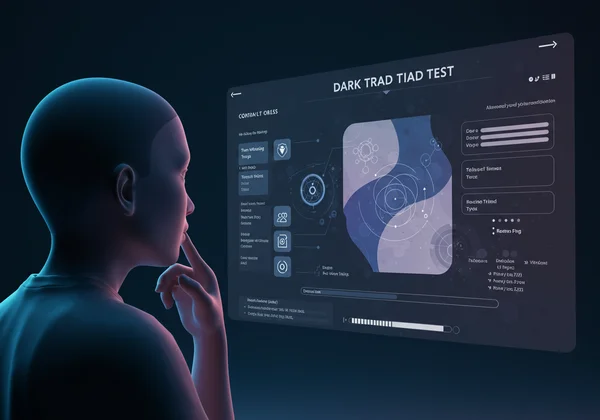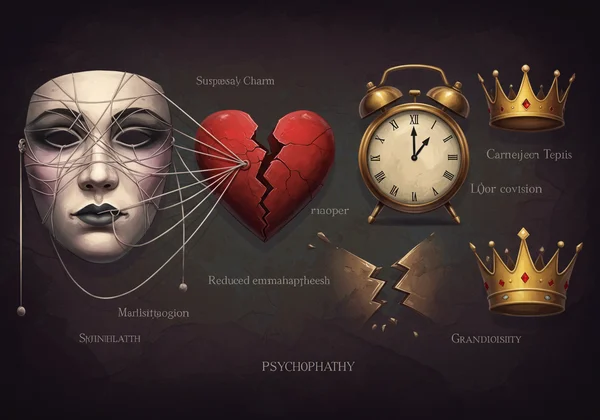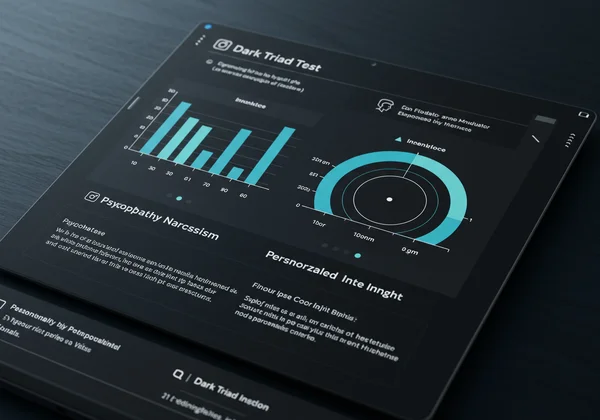Psychopathy & Dark Triad Test: Uncover the Trait
September 15, 2025 | By Julian Vance
The term "psychopathy" often conjures dramatic images from movies and fiction, but the psychological reality is far more nuanced and complex. It's one of the three core traits in a personality framework known as the Dark Triad. Many of us are curious about the hidden facets of our own personalities and the behaviors of others. You might even be asking, How do I know if I have dark triad traits? Understanding these traits is not about labeling people, but about gaining deeper self-awareness.
Exploring this topic through a tool like the dark triad test offers a confidential and insightful path to self-discovery. It provides a framework for understanding certain tendencies, such as a lack of empathy, impulsivity, and manipulative behavior. This article will demystify psychopathy as a personality trait, explore its place within the Dark Triad, and show how understanding it can be a powerful step toward personal growth. If you're ready to look beyond the surface, you can start your personality assessment today.

Understanding Psychopathy Traits
Psychopathy is often misunderstood, largely due to its sensationalized portrayal in popular culture. In psychology, it is not a simple "good or bad" label but a specific set of personality characteristics. Understanding these traits objectively is the first step toward recognizing how they might influence thoughts, feelings, and actions in ourselves and others.
What is Psychopathy? Defining Core Characteristics
At its core, psychopathy as a personality trait is characterized by a distinct combination of interpersonal, affective, and behavioral features. It’s important to see these as existing on a spectrum; everyone might exhibit some of these characteristics to a minor degree at some point. However, in individuals with higher levels of psychopathic traits, these features are more pronounced and consistent.
Key characteristics often include:
-
Reduced Empathy and Remorse: A diminished ability to understand or share the feelings of others, often coupled with a lack of guilt for one's actions.
-
Superficial Charm: An ability to appear likable, engaging, and smooth on the surface, which can mask underlying intentions.
-
Impulsivity and Poor Behavioral Control: A tendency to act on a whim without considering the consequences, often leading to irresponsible or risk-taking behavior.
-
Grandiose Sense of Self-Worth: An inflated view of one's own abilities and importance, which can manifest as arrogance.
-
Manipulative Tendencies: Skillfully using others to achieve personal gain, often without regard for their well-being.

How Psychopathic Tendencies Manifest in Behavior
These core characteristics translate into observable behaviors that can impact relationships and professional life. A person with prominent psychopathic traits might be the charismatic colleague who subtly undermines their team for a promotion or the friend who consistently borrows money with no intention of returning it. Their manipulative behavior is often strategic and goal-oriented.
Because they experience emotions less intensely, particularly social emotions like shame or anxiety, they may remain calm under pressure—a trait that can be advantageous in certain high-stakes professions. However, this same emotional detachment can lead to cold, calculated actions and difficulty forming deep, genuine connections with others. Understanding these patterns is key to navigating interactions with individuals who display these traits.
Dark Triad Psychopathy: Its Place in the Triad
Psychopathy does not exist in a vacuum. It is one of three interconnected yet distinct personality traits that form the Dark Triad, alongside Narcissism and Machiavellianism. Understanding Dark Triad psychopathy means looking at how this trait interacts with the other two to create a unique psychological profile.
The Interplay with Narcissism and Machiavellianism
While all three Dark Triad traits share a common core of manipulativeness and a self-centered worldview, they have different flavors and motivations.
- Narcissism is primarily driven by ego and the need for admiration. A person high in narcissism craves validation and believes they are superior.
- Machiavellianism is characterized by strategic, long-term manipulation. It’s a calculated approach to life, viewing people as pieces on a chessboard to achieve one’s goals.
- Psychopathy is distinguished by high impulsivity and a profound lack of empathy. While someone high in Machiavellianism might manipulate for a future gain, someone with psychopathic traits might do so for immediate gratification or stimulation.
When these traits combine, they can amplify one another. For instance, the impulsivity of psychopathy mixed with the entitlement of narcissism can lead to particularly reckless and self-serving behavior. Exploring your own profile through a dark triad personality test can reveal how these traits balance within you.

Psychopathy as a Spectrum, Not a Clinical Diagnosis
This is a critical distinction. The Dark Triad test and this discussion focus on subclinical traits—meaning personality tendencies that do not necessarily meet the criteria for a clinical disorder. A high score on the psychopathy scale of a dark triad test does not mean you have Antisocial Personality Disorder (ASPD).
Think of it like height: everyone has it, but some people are taller than others. Similarly, these personality traits exist on a continuum. Our goal is to provide a tool for self-exploration and awareness, not a medical diagnosis. Acknowledging where you fall on this spectrum is an empowering act of self-reflection, offering clues to your behavioral patterns and areas for potential growth.
Psychopathy vs. Sociopathy: Key Differences
The terms "psychopath" and "sociopath" are often used interchangeably, but in psychological discussions, they refer to different concepts, particularly regarding their potential origins. Clarifying the psychopathy vs. sociopathy distinction helps refine our understanding of these complex behavioral patterns.
Differentiating Origins and Behavioral Patterns
The primary theoretical difference lies in the "nature vs. nurture" debate. Psychopathy is often thought to have a stronger genetic or biological component. Individuals with these traits may have underlying differences in brain structure and function that contribute to their lack of empathy and fear response. Their behavior is often more controlled and calculated.
Sociopathy, on the other hand, is more commonly linked to environmental factors, such as a traumatic childhood or a history of abuse. This can lead to behavior that is more erratic, impulsive, and disorganized. While both may engage in antisocial behavior, the person with sociopathic traits might find it harder to maintain a steady job or a façade of normalcy, whereas the individual with psychopathic traits can often mimic social conventions convincingly. Discovering where your traits lie can begin with a simple online test.
Taking a Psychopathy Test for Self-Awareness
Curiosity about the "darker" side of personality is natural. A well-designed psychopathy test, framed within the context of the Dark Triad, is a safe and constructive way to satisfy that curiosity. It transforms abstract psychological concepts into personal, tangible insights.
The Value of Online Dark Triad Assessments
Online assessments like our Dark Triad Test provide a confidential, accessible first step toward greater self-knowledge. Based on established psychological research, our test measures where you land on the spectrum of all three traits, giving you a complete picture. You receive an instant summary report that helps you understand your unique personality blend.
For those seeking deeper understanding, we also offer an optional, AI-powered analysis. This report translates your scores into personalized insights about your strengths, challenges, and how your traits might play out in real-world scenarios. This is not about judgment; it is about providing a clear mirror for reflection. Discover your Dark Triad profile and see what you can learn.

Using Results for Personal Growth & Understanding Others
Receiving your results is the beginning, not the end, of the journey. Understanding that you may have, for example, Machiavellian tendencies can help you consciously choose more collaborative strategies at work. Recognizing a lower level of affective empathy can prompt you to actively practice perspective-taking in your relationships.
These actionable insights empower you to manage your natural inclinations in a way that aligns with your goals and values. It also fosters greater empathy for others. When you understand the psychological drivers behind certain behaviors, you can respond to challenging people with more wisdom and less frustration. Ultimately, this knowledge is a tool for building a more conscious and fulfilling life.
Empowering Self-Discovery: Your Path to Understanding
Psychopathy, stripped of its mythos, is a personality trait defined by a lack of empathy, impulsivity, and a charming but manipulative exterior. As a component of the Dark Triad, it offers a crucial lens through which to view human behavior—including our own. By understanding it as a spectrum and not a damning label, we open the door to meaningful self-reflection and growth.
This knowledge is not meant to create anxiety but to empower. It provides a language and a framework to make sense of complex human dynamics. The journey to self-awareness involves looking at all parts of ourselves, the light and the dark, with curiosity and honesty.
Ready to uncover your unique personality profile? Take the free Dark Triad Test now and begin your path toward greater self-awareness and personal growth.
Frequently Asked Questions About Psychopathy & The Dark Triad
How do I know if I have Dark Triad traits?
The most reliable way to explore this is through a structured assessment. While you can look for patterns like manipulativeness, a sense of entitlement, or impulsivity in your behavior, a validated tool like our Dark Triad test provides objective, science-based feedback on where you score across all three traits.
Are there different "types" of psychopathy?
In psychological research, psychopathy is generally viewed as a single construct with different facets (interpersonal, affective, lifestyle, antisocial). However, some researchers discuss concepts like "primary" psychopathy (often linked to genetics) and "secondary" psychopathy (more related to environmental factors and anxiety). Our test measures the overarching trait as part of the Dark Triad.
How might someone with psychopathic traits typically act?
Behavior can vary widely. They might be a charismatic leader who makes ruthless decisions, a charming partner who is emotionally unavailable, or an thrill-seeking individual who engages in risky behaviors. A common thread is a goal-oriented approach that often disregards the feelings and rights of others, combined with an ability to rationalize their actions. You can learn more by taking the Dark Triad assessment.
Can psychopathy or Dark Triad traits be "cured"?
These are considered stable personality traits, not illnesses to be "cured." However, awareness is the first step toward change. An individual can learn to manage their tendencies and develop strategies to behave in more pro-social ways. The goal of understanding these traits through a tool like the dark triad personality test is not a cure, but rather self-management and personal development.
Disclaimer: This article is for informational and educational purposes only. The Dark Triad Test is a tool for self-exploration and is not a substitute for a professional clinical diagnosis or psychological advice.